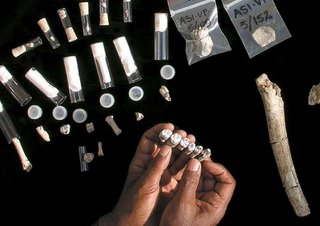Press Release from From the UC – Berkeley on www.eurekalert.org

Berkeley -- New fossils discovered in the Afar desert of eastern Ethiopia are a missing link between our ape-man ancestors some 3.5 million years ago and more primitive hominids a million years older, according to an international team led by the University of California, Berkeley, and Los Alamos National Laboratory in New Mexico.
The fossils are from the most primitive species of Australopithecus, known as Au. anamensis, and date from about 4.1 million years ago, said Tim White, a UC Berkeley professor of integrative biology and one of the team's leaders. The hominid Australopithecus has often been called an ape-man because, though short-statured, small-brained and big-toothed, it walked on two legs unlike the great apes.
More primitive hominids in the genus Ardipithecus date from between 4.4 million and 7 million years ago and were much more ape-like, though they, too, walked on two legs.
"This new discovery closes the gap between the fully blown Australopithecines and earlier forms we call Ardipithecus," White said. "We now know where Australopithecus came from before 4 million years ago." The fossil finds and an analysis of the hominid's habitat and evolutionary position are reported by White and co-authors from Ethiopia, Japan, France and the United States in the April 13 issue of Nature.
Since the first Australopithecus skull, the famous Taung child, was discovered in South Africa 82 years ago by Raymond Dart, fossils of this hominid have been found all over eastern Africa spanning a 3-million-year time period. Seven separate species have been named, including the most primitive, Au. anamensis, which dates from 4.2 million years ago, and Au. africanus, Dart's find. The most specialized species, Au. boisei, died out about 1.2 million years ago, long after the genus Homo had spread throughout the Old World...
To read the full press release, click on the link to eurekalert above to be redirected.
No comments:
Post a Comment